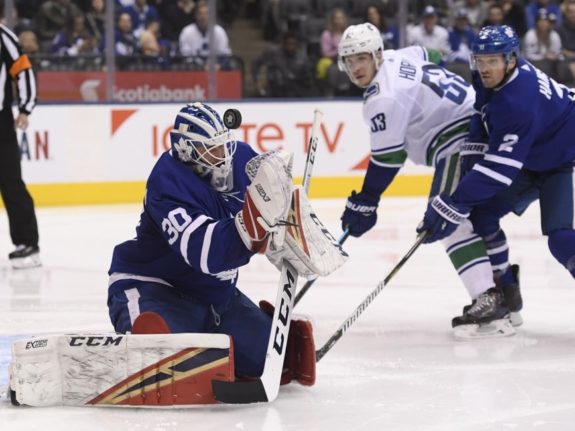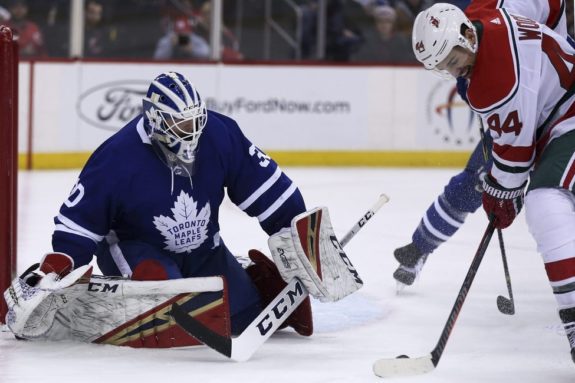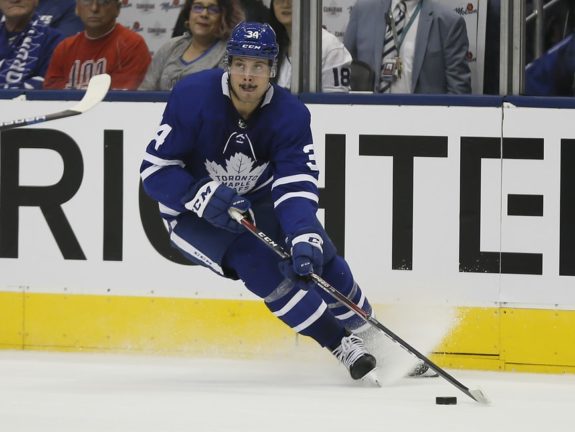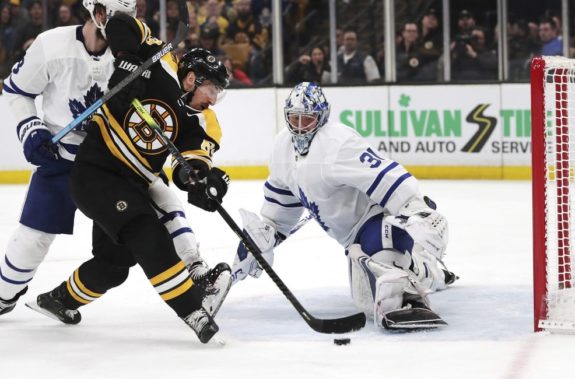It’s hard not to feel sorry for Michael Hutchinson. Every time the Toronto Maple Leafs have back-to-back games, he gets to play the second game. In contrast, the Maple leafs number-one goalie Frederik Andersen has the much easier task of playing in the first game.
Related: How Good Does the Maple Leafs’ Hutchinson Feel Right Now?
It happened again on Saturday evening in Montreal; Andersen had played the night before in Toronto when the Maple Leafs beat the visiting San Jose Sharks 4-1. Then it was Hutchinson’s turn in the twine, and – no surprise this season – the team looked tired. Eventually Hutchinson was overwhelmed and lost 5-2 to the Montreal Canadiens.

Mike Babcock Knows the Deal
Even head coach Mike Babcock admits it, although not specifically speaking about Hutchinson, when he suggested, “Obviously there’s a reason why teams aren’t as good in the second game. But they’re on your schedule, so what are you going to do about it? We just happen to be unfortunate because we’ve had four in October.”
Unfortunate is correct. But perhaps the most unfortunate player of all is the backup goalie. Playing in the second game of a back-to-back is difficult for any player, but it’s a huge disadvantage to the goalie. The skaters in front of him are obviously tired and with good reason. It isn’t just playing two games in two nights; it’s the travel and lack of sleep that happens in between. It’s both a mental and physical grind, which makes the players prone to both mental and physical errors.
Related: Maple Leafs Team News: Matthews, Marleau, Kapanen, Babcock & More
Life for Hutchinson in Goal
Back-up goalie Hutchinson gets to play every second game of a back-to-back. From what I saw tonight as I watched the game, he did not look horrible. He made some great saves during the second period, some of the acrobatic variety.
However, obviously, the tide turned and Hutchinson was hung out to dry by the play in front of him. No surprise, other teams have professional hockey players with NHL skills. Sooner or later, they’ll take advantage of errors and score.

Against the Canadiens, mistakes were made. That’s the nature of hockey, and the Maple Leafs were often too tired – both mentally and physically – to prevent those mistakes from turning into problems. From what I saw, that was the case for Hutchinson.
How the Maple Leafs-Canadiens Game Unfolded
The writer (Kelsey Patterson), who posted immediately after the game for CBC, suggested that, “The Maple Leafs simply ran out of steam.” I have no quibble with that assessment because that’s exactly what it looked like to me as I watched the game on Hockey Night in Canada.
Related: Sluggish Maple Leafs Looking to Reset
It was a game of momentum. The Maple Leafs were out of it at the beginning of the game, and the Canadiens skated them into the ice and took an early 2-0 lead. In the second period, the Maple Leafs rallied and made a game of it. But, in the third period, the team gave up two breakaways, an odd-man rush, and three goals in the third period of a 5-2 loss.
As Auston Matthews noted, “You can’t give up two breakaways and a 2-on-1 with the game that close. They obviously capitalized on their opportunities. We just have to find a way not to give those opportunities up. Maybe then it’s a 3-2 or a 2-2 game in the third period and we’re battling.”

Matthews added, “We didn’t necessarily take our foot off the gas, but a couple of mental errors that they capitalized on. You just can’t do that.”
It could be that these mental errors come because the team is deficient; but, it’s also likely that such mental errors come at least in part because the players are tired. I’m not blaming the players here, just suggesting that it puts the goalie at a disadvantage.
Related: NHL Rumors: Bruins, Maple Leafs, Oilers, More
Obviously, Hutchinson let in five goals and that’s a lot of goals. But, really, how much of this is on him? It’s easy to call him a poor NHL goalie, and he might be. However, we really can’t know for sure. He’s not given many chances to succeed when the odds of his success are high, unlike Andersen.
Babcock’s Choices Are Considered
From what I hear, see, and read, Babcock is a thoughtful coach. He considers his choices and, like it or not, he makes the choices he believes are right for his team. As many fans and hockey commentators have pointed out, he’s stubborn that way.
Given his choice to start Hutchinson every second game of back-to-backs and realizing the difficulty that puts a backup goalie in, it’s obvious Babcock makes this choice on purpose. It’s his call. He’s got to know the second goalie has less of a chance winning the second game of a back-to-back than the goalie of the first back-to-back game.
By making this choice, Babcock is protecting Andersen from the difficulty of the second back-to-back game. Babcock knows exactly what he’s doing. He’s “sacrificing” his backup goalie’s record so that his number one goalie (and his team) can have a better chance of success.

That makes sense: if the Maple Leafs make the playoffs, the team will ride Andersen through the entire playoffs. It’s good when your number one goalie enters the playoffs with confidence. Ergo, if that costs the back-up goalie a good winning percentage or goals against average (GAA), is that really a problem?
For Hutchinson, that’s simply the cost of being Babcock’s back-up goalie. And that makes it difficult to really judge how good he is as a goalie. I’m sure Hutchinson is happy to be playing and earning his $700,000 salary. He probably wanted to be an NHL goalie when he was a kid, and now he is. My point in this post is that he probably won’t be that successful given his deployment.
Related: Hockey Goalies – A Breed Apart
Interestingly, Hutchinson has played five games this season and played five games last season. Last season, he was the goalie when Andersen was injured: this season, Andersen is healthy. The difference? Last season, his record was 2-3, with a 2.64 GAA and a .914 save percentage (SV%). This season, his record is 0-3-1, with a 4.26 GAA and a .885 SV%. The difference is in his deployment.
I’ve read recently a number of hockey commentators who suggest that, given the difficulty of the second game of a back-to-back, Babcock should play Anderson in the second game and Hutchinson in the first. There’s a logic to that, but it isn’t the logic Babcock uses. After all, he’s the coach.